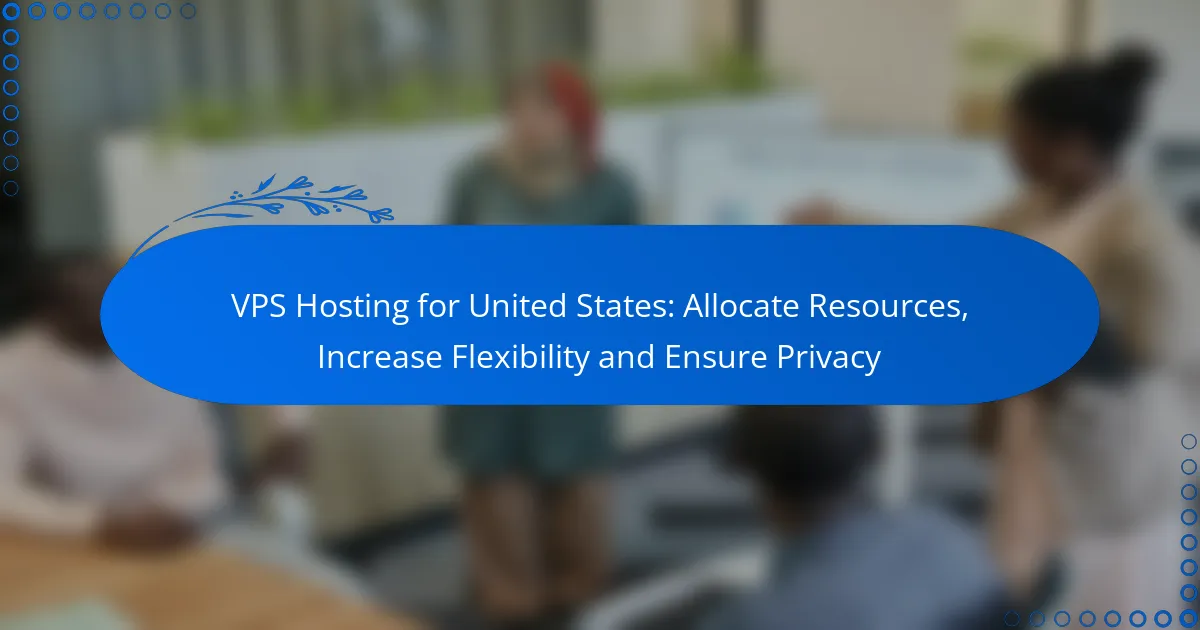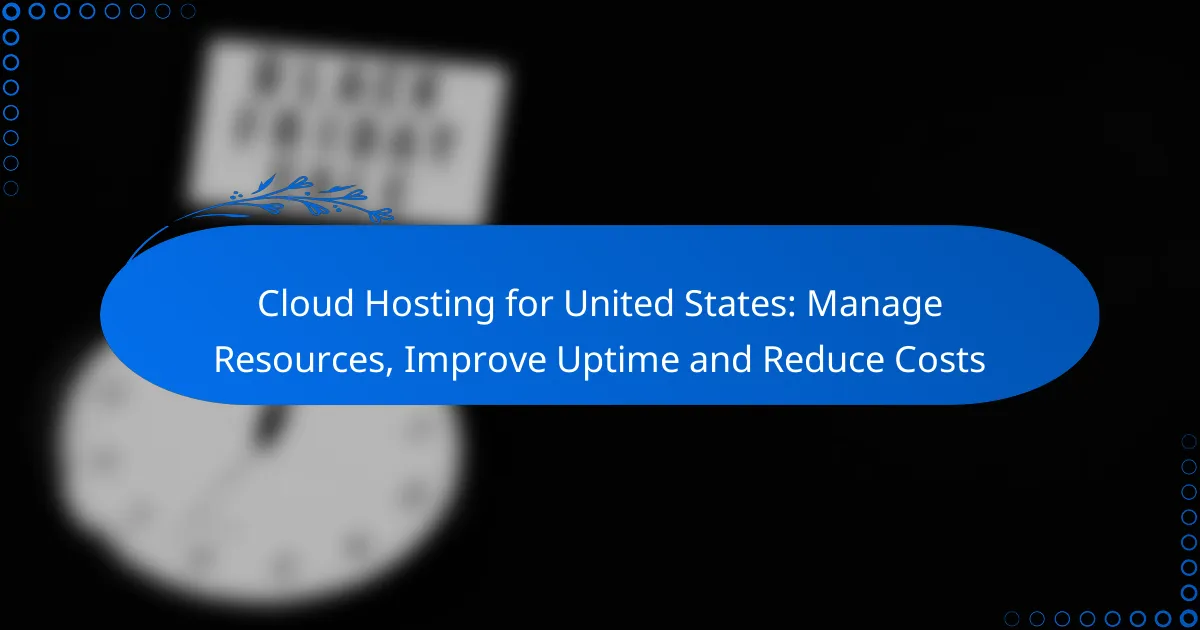VPS hosting in the United States offers dedicated resource allocation, enhancing website performance and reliability. With customizable environments and root access, it ensures greater flexibility and control. Additionally, VPS hosting significantly boosts data privacy, reducing the risk of breaches compared to shared hosting. Understanding pricing structures and key provider features is essential for making an informed choice.

What Are the Benefits of VPS Hosting in the United States?
VPS hosting ensures dedicated resource allocation, providing your website with the necessary bandwidth and processing power. Unlike shared hosting, where resources are split among multiple users, VPS creates a virtual environment with reserved resources tailored to your needs. This allows your website to handle significantly higher traffic—up to 100 concurrent users—without performance dips. For example, businesses can choose RAM options from 1GB to 32GB, CPU cores from 1 to 8, and storage from 20GB to 1TB, ensuring smooth operation even during peak times. Effective resource allocation leads to fewer downtimes, improved loading speeds, and enhanced user experiences, potentially boosting conversion rates by as much as 20%.
Resource allocation
VPS hosting offers increased flexibility in managing your server environment, allowing users to install custom software, configure settings, and choose their operating system. This level of control is particularly beneficial for businesses with unique technical requirements. For instance, if your application needs a specific version of a programming language or database, VPS hosting enables you to set it up without restrictions. This adaptability fosters innovation, allowing companies to implement changes swiftly and maintain a competitive edge. Additionally, VPS hosting supports diverse business models, from e-commerce to SaaS platforms, enabling experimentation with configurations that can enhance productivity by up to 30%.
Increased flexibility
Privacy is a significant advantage of VPS hosting, especially for businesses handling sensitive data. With a VPS, your data is isolated from other users, greatly reducing the risk of unauthorized access. This separation is crucial for compliance with data protection regulations like GDPR or HIPAA, which impose hefty fines for breaches—up to 4% of annual revenue. For example, businesses in healthcare or finance can leverage the enhanced privacy that VPS offers, maintaining customer trust and avoiding costly breaches. Furthermore, VPS hosting typically includes advanced security features like firewalls and DDoS protection, ensuring a secure environment that enhances brand reputation and customer loyalty.
Enhanced privacy
VPS hosting significantly improves website performance compared to shared hosting, with dedicated resources enabling faster load times and the ability to handle more simultaneous users—often up to 500 without crashing. This performance boost is vital for retaining visitors and improving search engine rankings, as studies indicate that a 1-second delay in page load time can lead to a 7% reduction in conversions. For instance, a retail website during a sale can experience a traffic surge, and VPS hosting ensures it remains responsive, providing a seamless shopping experience that directly impacts sales and customer satisfaction. Moreover, improved performance can enhance SEO outcomes, as search engines favor fast-loading websites, resulting in higher visibility and increased organic traffic.
Improved performance
VPS hosting is often more cost-effective than dedicated hosting while delivering similar benefits, with plans typically ranging from $20 to $100 per month. Businesses can enjoy dedicated resources without the high costs of maintaining a physical server, making VPS an attractive option for startups and small to medium-sized enterprises. For instance, a company can start with a lower-tier VPS plan and upgrade as their needs grow, allowing for effective budget management while still leveraging the advantages of a VPS environment. Additionally, VPS hosting usually includes maintenance and support, minimizing the need for in-house IT resources. This cost-effectiveness enables businesses to allocate funds to other critical areas, such as marketing and product development, fostering growth and innovation that positions the company for future success.
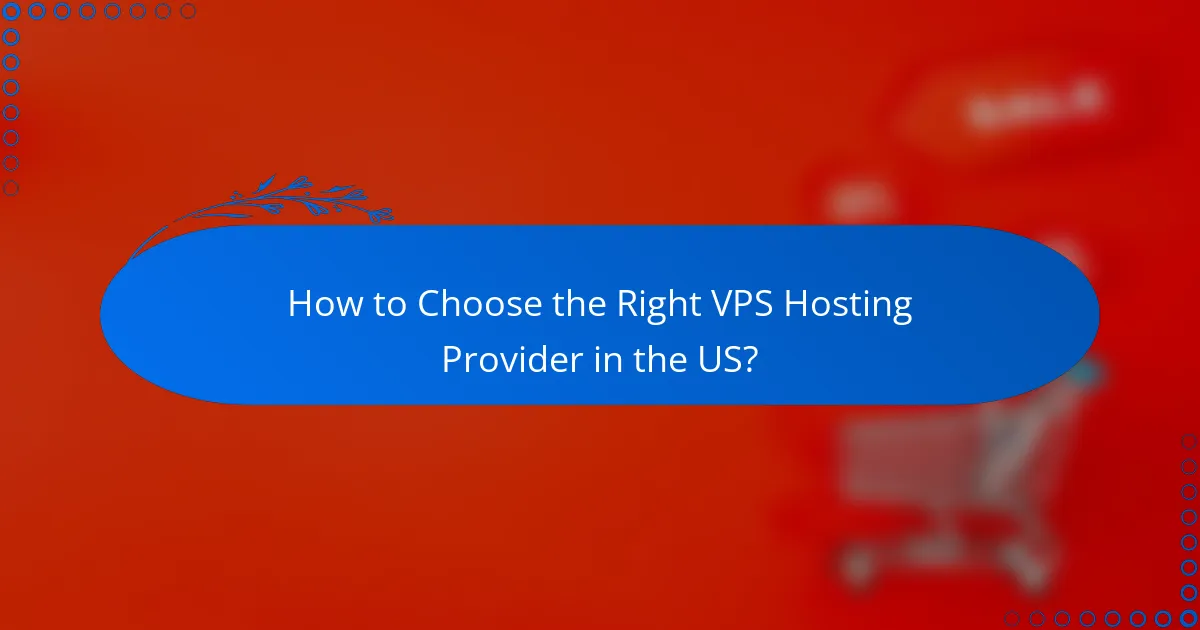
How to Choose the Right VPS Hosting Provider in the US?
Choosing the right VPS hosting provider in the US requires careful evaluation of key factors like server locations, customer support, and scalability. A well-informed decision can boost your website’s performance and reliability, potentially enhancing loading speeds by up to 50% and minimizing downtime to less than 1%.
Evaluate server locations
Server locations play a vital role in reducing latency and maximizing speed. Providers with strategically placed data centers across the US can significantly improve access for local users. For example, if your target audience is mainly in New York, opting for a provider with a data center in that area can cut loading times to under 2 seconds, crucial for keeping visitors engaged.
Check customer support options
Consider the geographical diversity of server locations, which enhances redundancy and reliability. A provider with multiple data centers can keep your website accessible during outages, with many offering 99.9% uptime guarantees. This diversity also helps with compliance to data sovereignty laws, which can differ widely between states.
Assess scalability features
When assessing server locations, start by identifying where your primary audience resides. This strategic focus aids in selecting a provider with data centers near your users, ensuring optimal performance. For instance, if your business targets the West Coast, choosing a provider with servers in California can improve access speed for that demographic by 30%.

What Are the Key Features of VPS Hosting?
VPS hosting stands out from shared hosting due to several key features: dedicated resources, customizable environments, and root access. Together, these elements enhance performance, control, and security for users seeking dependable web solutions.
Dedicated resources guarantee that your virtual server has its own allocated CPU, RAM, and storage, typically ranging from 1GB to 16GB of RAM, depending on the plan. This isolation ensures your website’s performance remains unaffected by other users on the same server, resulting in faster load times—often up to 50% quicker—and improved reliability.
For example, during a spike in traffic, such as a promotional event, dedicated resources enable your website to handle the increased load without crashing. This is especially crucial for e-commerce sites or businesses that depend on consistent uptime, as even a 1-second delay in page load time can lead to a 7% drop in conversions.
Ultimately, dedicated resources lead to a better user experience, positively influencing your search engine rankings, as Google favors fast-loading websites in its algorithms.
Dedicated resources
In VPS hosting, dedicated resources mean your server’s CPU, RAM, and bandwidth are exclusively yours, typically starting from 1 CPU core and 20GB of storage. This separation from other users ensures your applications run smoothly without interference, providing a stable environment for critical operations.
For instance, if you run a high-traffic website or resource-intensive applications, dedicated resources can significantly boost performance, with reports showing that sites with dedicated resources can handle up to 300% more traffic. You won’t need to worry about other users consuming your allocated resources, which can cause slowdowns and downtime.
This feature is vital for businesses that require consistent performance, especially during peak times like holiday sales or product launches. It allows for predictable server behavior, essential for effective planning and scaling, ensuring you can meet customer demands without interruption.
Customizable environments
Customizable environments in VPS hosting enable users to tailor their server settings to specific needs, with options for various operating systems like Linux or Windows. This flexibility is a major advantage over shared hosting, where options are often limited and predefined.
Users can select their operating system, install custom software, and adjust settings to optimize performance. For example, a developer can create a specific environment for testing applications without impacting the production server, potentially reducing deployment errors by up to 40%.
This level of customization not only enhances functionality but also allows businesses to innovate and adapt swiftly to changing demands, facilitating rapid deployment of new features or services. It empowers users to create an environment that best suits their operational needs, fostering agility and responsiveness.
Root access
Root access grants users complete control over their VPS environment, similar to having a dedicated server. This means you can install, configure, and manage software as needed, allowing for extensive customization and security.
With root access, you can implement security measures, optimize server performance, and customize software installations. For instance, you might install a specific version of a database or web server that aligns with your application’s needs, potentially improving performance by as much as 30% when optimized correctly.
This degree of control is particularly advantageous for developers and businesses that must maintain specific configurations or security protocols, such as compliance with industry standards. It ensures you can effectively tailor your server environment to meet your unique needs, paving the way for enhanced operational efficiency and security.
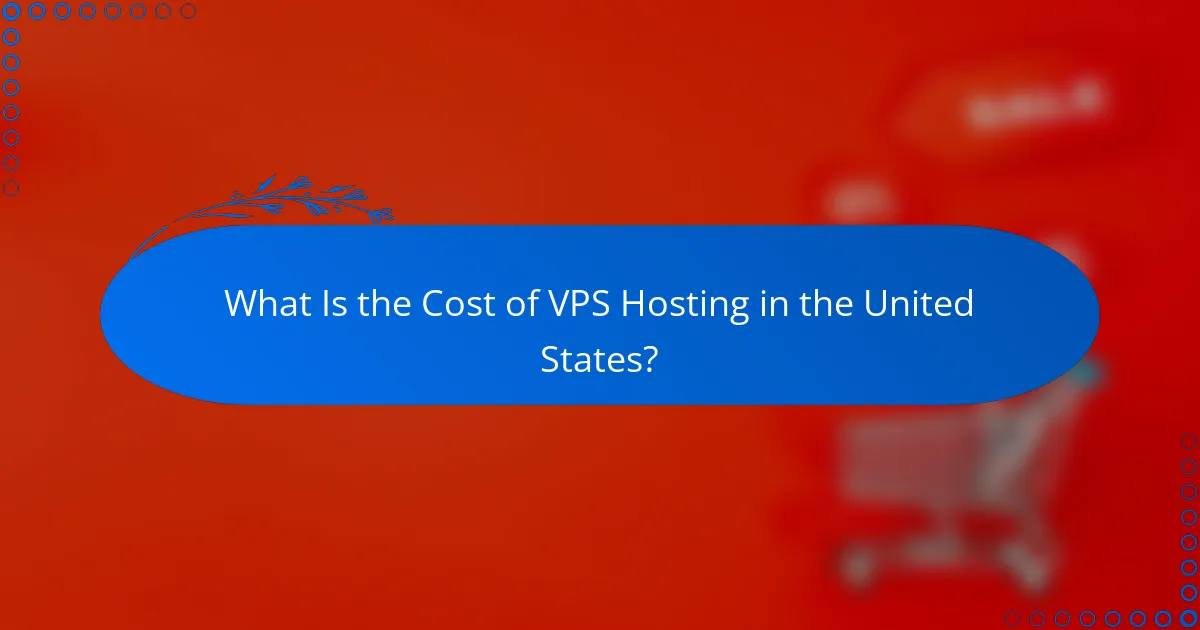
What Is the Cost of VPS Hosting in the United States?
The cost of VPS hosting in the United States typically ranges from $20 to $100 per month, influenced by factors like resource allocation, customer support, and additional features. Entry-level plans may provide 1 CPU core and 1GB of RAM, while higher-tier options can offer up to 8 CPU cores and 32GB of RAM, catering to diverse business needs. Grasping these pricing structures is essential for making an informed decision, especially since hosting companies vary in service levels, impacting your overall experience.
Monthly pricing models generally fall into three categories: pay-as-you-go, flat-rate, and tiered pricing. Pay-as-you-go models charge based on actual resource usage, benefiting businesses with fluctuating workloads. In contrast, flat-rate pricing offers a consistent monthly fee, perfect for budgeting. Tiered pricing enables users to choose packages that match their specific needs, such as basic tiers with limited resources versus higher tiers that include advanced features like automated backups and enhanced security protocols, facilitating easier scaling as your business expands.
Several key factors influence the cost of VPS hosting, including server specifications, geographical location, and customer support levels. For example, a VPS with 4 CPU cores and 8GB of RAM might cost around $50 per month, while a server in a low-latency data center could command a premium. Furthermore, managed VPS hosting, which often includes 24/7 technical support and maintenance, can be significantly pricier than unmanaged options, sometimes by as much as 30%. Understanding these variables can help you navigate the pricing landscape more effectively.
When assessing popular VPS hosting providers in the United States, consider their pricing structures, feature sets, and customer support levels. For instance, DigitalOcean starts at $5 per month for basic services, appealing to developers, while Bluehost offers plans beginning around $19.99 per month, designed for small businesses. Linode is known for its transparent pricing and strong performance, while HostGator provides a range of plans for various budgets, emphasizing customer service. A2 Hosting distinguishes itself with a focus on speed and reliability, making it a solid choice for both startups and established enterprises, ensuring you find a provider that meets your unique requirements.
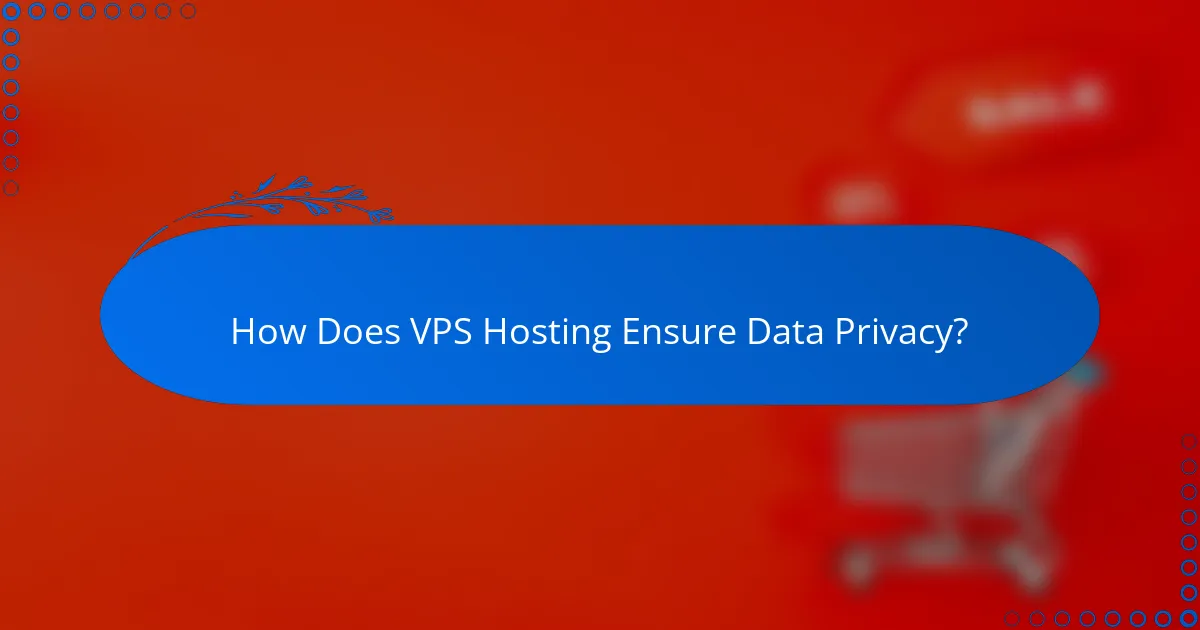
How Does VPS Hosting Ensure Data Privacy?
VPS hosting boosts data privacy by isolating your virtual server from others on the same physical machine. This separation prevents unauthorized access and data breaches, ensuring your information stays confidential. Studies reveal that businesses using VPS hosting experience up to 70% fewer data breaches than those on shared hosting plans. This stark contrast underscores the importance of selecting VPS for protecting sensitive information.
Isolation from other users
In a shared hosting environment, multiple users share the same resources, heightening the risk of data leaks. Conversely, VPS hosting allocates dedicated resources to each user, fostering a secure environment capable of managing varying traffic loads without sacrificing security. This dedicated allocation can enhance performance metrics, with VPS users reporting load times up to 50% faster than those on shared servers.
